WORKSHOPS
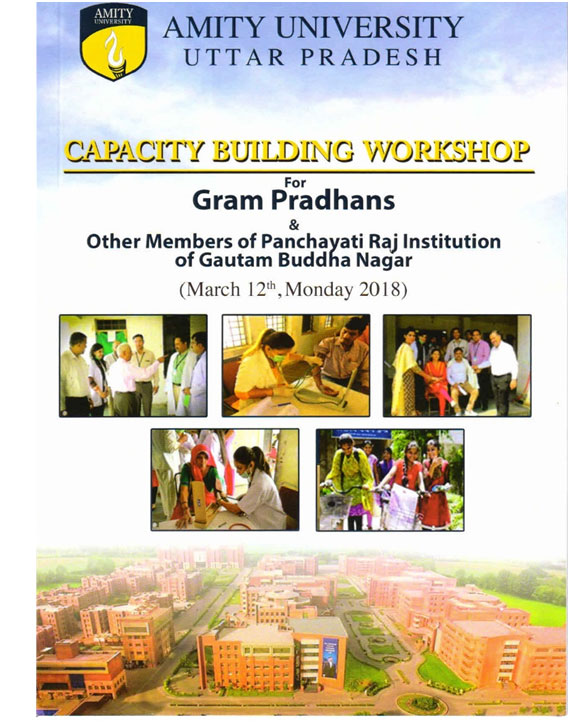
Amity Institute for Social Sciences organized a Training Workshopon “Field Projects: Opportunities and Challenges in Social Laboratory” on 28th February, 2014 which was conducted by the Country Director Ms. Geeta Malhotra of the reputed Trust- Read India along with 17 participants from READ-India Centres across the country. Prof. Nirupama Prakash, Director AISS welcomed the resource persons, AISS students and faculty and highlighted the importance of conducting field research in various domains of Social Sciences.
Read India is an extension of Read Global. It expanded to India in 2007 to empower women and marginalized groups, and create educational and economic opportunities in rural areas. Areas of work include states of Delhi, Haryana, Maharashtra, Manipur, Karnataka, Rajasthan, Uttar Pradesh, and West Bengal. READ Centers focus on giving women the chance to learn to read, teaching people about their rights, and giving rural villagers skills to earn a living. Sustaining enterprises range from a gooseberry processing facility, to sewing and weaving businesses. READ India is home one of our all-women-operated centers, as well as several women’s self-help groups.
The workshop was conducted in a very cognitively friendly manner, with as many as 17 people citing their personal accounts and experiences as to how their lives changed on their association with READ.
The examples ranged from child education to women empowerment and in some cases also setting up enterprises to achieve a sustainable living and development. An example cited by Poonam, who looks after the vocational training of women, sumed up all the activities that READ endorses. She cited the example of a woman Kamlesh, who was living a troubled married life. Many a times she tried to learn sewing at the center but somehow, she couldn’t sustain through the course. This was majorly due to the marital discord and unhappy family back home. She often was subjected to domestic violence and ultimately one day she packed her bags and left her home for the center. But at the center she was discouraged for taking this action and all the more discourage for going to police. Rather the idea at the center was to find the solution. Since Kamlesh was uneducated and didn’t know sewing as well, she felt helpless. But a chance thought on behalf of a certain center member, her life changed!
Kamlesh is a proficient cook as per Poonam and therefore was encouraged to invest in her little startup so that she could have her own income. It is a wide spread observation that marital discords mostly happen due to the difference of the economic levels of the spouses, especially more so when one, that is mostly the females, are dependent on the other. It has been few years to that business enterprise of Kamlesh who owns a food stall and earns a respectable and decent living for herself as well her children. She has reported of a happy family life ever since. Of course, there was hep provided by the center, to which Kamlesh considers herself obliged to.
This is a clear example of the women empowerment, economic growth of women, children welfare and most importantly spreading awareness about the rights each individual has. This is actively done by the READ organization.
As we proceeded towards the second half of the Workshop, students were explained the process and ways through which the organizations tries to reach through people. These processes can be summed up in a Logical Framework Analysis, which is a part of the curriculum of all students; i.e. Activities Process Measures Short term OutcomesIntermediate and Long-term Outcomes.
Be it opening a library or any other Center, the organization follows certain steps which briefly are:
- Process of realizing the Theories of Change
- Formulating Logical Models based on the theories- surveys and questionnaires are formulated at this stage
- Evaluation of the Plan
- Instruments overview- such as surveys and questionnaires are looked into carefully
- Funding is sort for
- Core Outcomes are adhered to
- Lastly, Mitigating the challenges- this is a future practice, i.e. any future obstacles are dealt with a year before instead of waiting for the last moment
Discussion was followed by the showcasing of two movies on women empowerment as depicted by Hetashi, a polio patient and children education which depicted the science fair held in Geejgarh (Rajasthan). The Workshop was formally ended by a vote of thanks given by Dr. Shalini Saxena. All in all the workshop conducted by AISS was a success! AISS students and faculty benefited a lot and had fruitful interactive sessions with the resource persons.
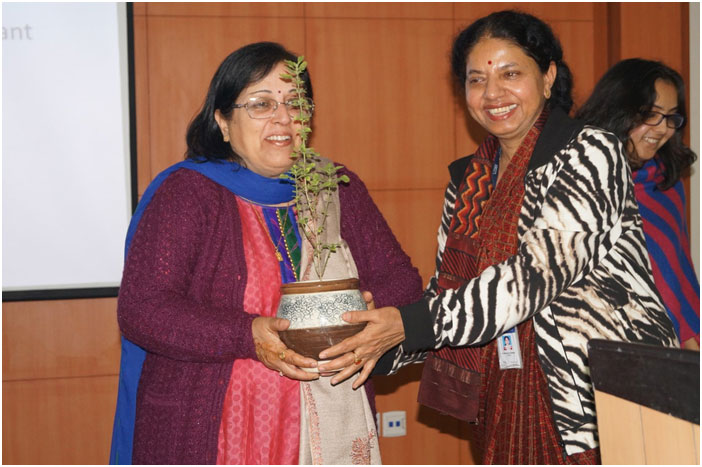
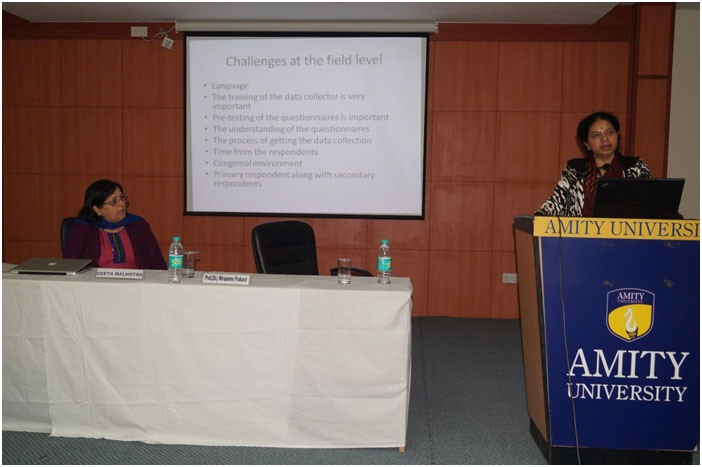
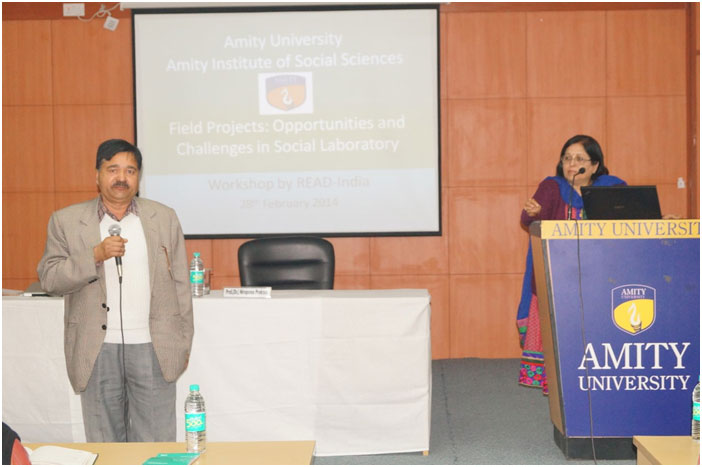
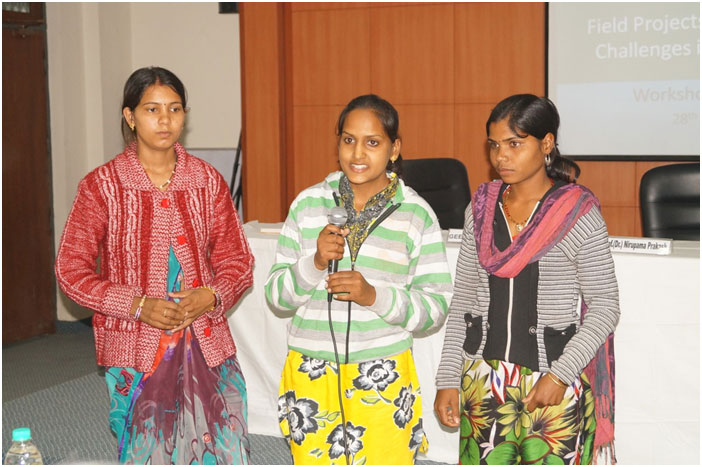
Date: 21st October, 2013
Venue: Amity University Campus, Uttar Pradesh, India
Organizedby: Jointly by Amity Institute of Social Sciences (AISS) and EMA IndiaChapter Sponsoredby: European Commission, Directorate General Education and Culture(EAC) through EMA
Participants: The workshop was addressed to over 400 students and faculty members from Amity University Uttar Pradesh. Following were the key speakers and organisers of theworkshop:
- Dr. Pavel Svitil, Minister-Counsellor and Dy. Head of Delegation of the European Union to India
- Mr. Pradeep Singh, IAS (Retd.), CEO & Dy. Dean, Indian School of Business – Mohali Campus
- Mr. Matthias Themel, Attaché – Economic Cooperation, Delegation of the EU to India
- Ms. Lynne Heslop, Sr. Education Advisor, British Council of India
- Dr. Ashok K. Chauhan, Founder President of the Foundation of Amity Institutions
- Prof. Dr. Balvinder Shukla, Acting Vice Chancellor, Amity University UP Prof. Dr. Nirupama Prakash, Director, AISS
- Mr. Prashanth Pattabiraman, EMA Alumni and Entrepreneur Dr. Vijita S. Aggarwal, EMA Alumni and Academician
- Mr. Chetan Singai, EMA Alumni and Research Scholar at National Institute of Advanced Studies, Indian Institute of Science
- Dr. S. Rajesh, EMA Alumni and IFS, Deputy Conservator of Forests, Government of NCT of Delhi
- Mr. Ateendra Kr. Singh, Vice President, EMA India Chapter Ms. Sriya Mohanti, Board member, EMA India Chapter
- Ms. Elsa Mathews, Regional Representative (West), EMA India Chapter Mr. Debajyoti Bhowmick, Regional Representative (East), EMA India Chapter
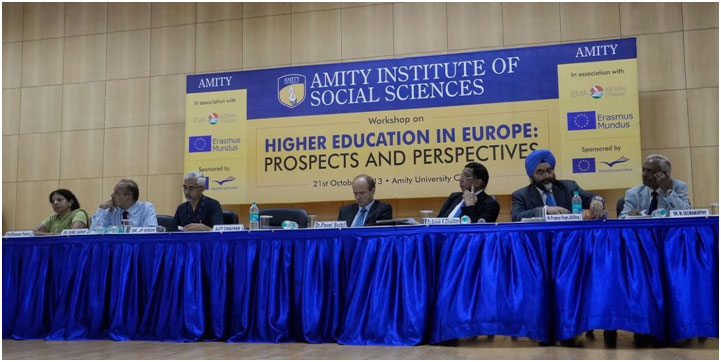
Amity Institute of Social Sciences, (AISS) Amity University, UP, India and Erasmus Mundus Students & Alumni Association (EMA), India Chapter jointly organized a Workshop on “Higher Education inEurope: Prospects & Perspectives” on October 21st 2013 at Amity University, Noida campus. The event was sponsored by European Commission, Directorate General Education and Culture (EAC)
Session 1 – Inaugural Session
The welcome address was given by Dr. Nirupama Prakash (Director, AISS) followed by a presentation by Maj. Gen. R.K. Dhawan (Sr. VP & Advisor, International Affairs Division) on Amity University and its accomplishments.
Mr. Ateendra Kr. Singh (VP-EMA India Chapter) introduced the Erasmus Mundus and its objectives to the larger audience of Amity. He also let the audience know the strength and potential of EM Alumni Association.
The Keynote Address was given by Mr. Pradeep Singh (CEO & Deputy Dean) of the Indian School of Business, Mohali). He impressed upon the changing pattern of global education which is a necessity in today's globalized world. Reflecting on his own experience and challenges of pursuing higher education abroad, he noted the change that has occurred over the years with more and more Indian students aspiring to pursue higher education abroad. He also added that this change has largely been possible due to the immense technological advancements that have been made in the last couple of decades.
Inaugural address was given by the Guest of Honour for the event, Mr. Pavel Svitil, Minister Counsellor & Deputy Head of the Delegation of the EU to India. He spoke about the concept of the European Union as a culmination of states and governance, the basis of free movements, goods and ideas. He emphasized on the importance to modernize higher education which is in the heart of the EU 2020 strategy. He mentioned there is need to train more researches in business and technology. The European Commission believes higher education leads to prosperity and with about 4000 universities, European education spreads beyond Europe, from Tajikistan to Turkey.
There is now focus on mobility based on credits as they are recognized both in the home and host countries. He officially announced the end of Erasmus Mundus as a program and beginning of Erasmus+ Scholarship starting from 2014. He said Europe is looking towards internationalization of education which is a necessity in today’s world both for Europe and other countries including India. As regard to India, he emphasized on the many EU study centers and cooperation programs between European and Indian universities, where there is much to learn from each other.
He mentioned about the many Masters courses which are being taught in English and touched upon the importance of knowing local European local language which may be helpful for future cooperation and business and to tap into the labour markets from countries such as Germany, France and Italy. He mentioned about the 2009 Declaration between Europe and India which seeks to improve cooperation and better standards. He also emphasized the need of recognition of degrees and mobility to facilitate working opportunity in a globalizedmarket.
The inaugural session was concluded by the Honourable Founder President of the Foundation of Amity Institutions, Dr. Ashok Chauhan. He welcomed the initiative and mentioned Amity University will take a lead role in building cooperation with the European universities.
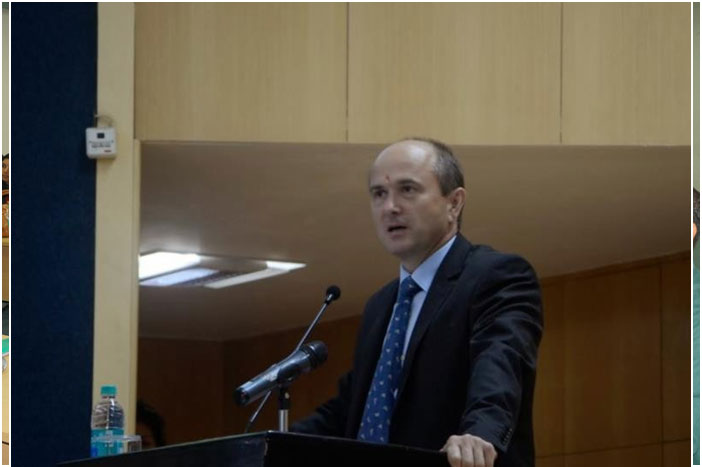
Mr. Pavel Svitil, Minister Counsellor & Deputy Head of the Delegation of the EU to India addressing the audience at the workshop
The technical session on higher education in Europe and experiences from the Erasmus Mundus program was opened by Mr. Matthias Themel (Attaché, Economic Cooperation, Delegation of the EU to India). He spoke about opportunities & prospects for pursuing higher education in Europe with special emphasis to Erasmus Mundus program. He gave an overview of the European education system from the Bologna process to the EU 2020 strategy. He emphasized on the policies to improve quality in higher education and priorities for 2010-20 which includes ECTS system for assessment of study performance. He gave a detailed explanation of Erasmus Mundus Action 1, 2 & 3 and other fellowships such as Marie Curie for higher education and research. He reiterated the importance of learning new language and culture which he sees as an investment and talks about the general information on studying in Europe.
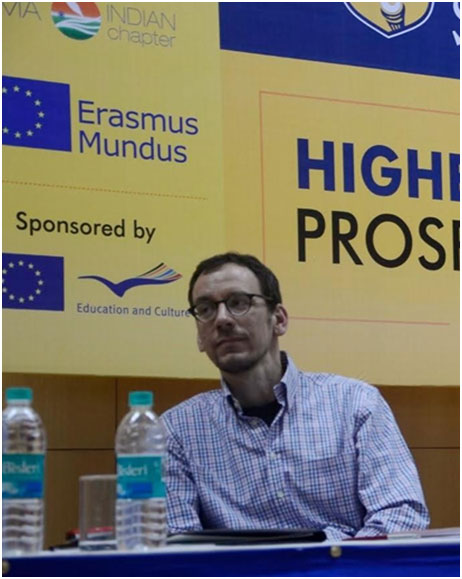
Mr. Matthias Themel, Attaché - Economic Cooperation, Delegation of the EU to India at the technical session
The next speaker was Ms. Lynne Heslop (Sr. Education Advisor, British Council, India) who gave UK's perspective of higher education in an evolving global environment and its impact on communities & society. She mentioned about the many core values which Erasmus Mundus and British Council shares. She believes education cannot be in isolation and talked about capacity building, access to research facilities and other multidimensional avenues. She talked about the culmination of subject knowledge and creative thinking and innovation. She thinks that learning is for life and the shift is towards critical and lateral thinking.
This was followed by discussions and experiences of the Erasmus Mundus Alumni namely Mr. Prashanth Pattabiraman, Dr. Vijita Aggarwal, Mr. Chetan Singai and Dr. S. Rajesh, who shared their own learning experience and life as a student in Europe. The discussions were moderated by Ms. Elsa Mathews (Western Regional Representative, EMA India Chapter).
Mr. Prashanth Pattabiraman shared his learning experience in the art of combing technology, design & business, which has lead him to be an entrepreneur with two start-up companies MixORG and Mobile Harvest.
Dr. Vijita Aggarwal talked about the importance of cross cultural dialogue and the ability to marinate different viewpoints of people from different societies with one’s own. She cautioned all future aspirants to do a thorough survey of merits of a particular course and be informed about the recognition of their degree back home.
Mr. Chetan Singai shared his experience as a student of the Erasmus Mundus programme, which offers a global education perspective along with cultural exposure through its transnational mobility structure. This balanced approach and rich exposure improves the career prospects of studentsimmensely.
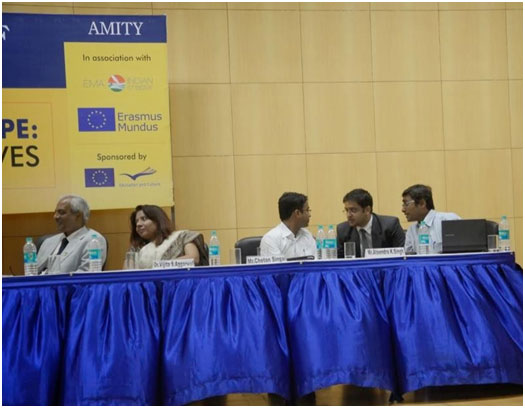
Dr. W Selvamurthy, Dr. Vijita Aggarwal, Mr. Chetan Singai, Mr. Ateendra Singh and Mr. Debajyoti Bhowmick at the technical session
Dr. S. Rajesh laid emphasis on the difference in studying in one particular university vs. traveling to multiple destinations. He acknowledged that he was able to learn the best practices in forestry management from multiple sources: an experience unique to Erasmus Mundus. This was followed by a long open question and answer session where audience indulged in an interactive discussion with the panelists.
The event ended by a concluding address by Dr. Ashok Chauhan where he announced the launch of an initiative on Amity & Erasmus Mundus Synergy Center with a seven (7) senior member team detailing strategy as to how to make use of action-1 & action -2 initiatives of EM scholarships. The workshop concluded with vote of thanks by Dr. W. Selvamurthy, President of Amity Science, Technology and Innovation Foundation (ASTIF) and Ms. Sriya Mohanti on behalf of EMA India Chapter.
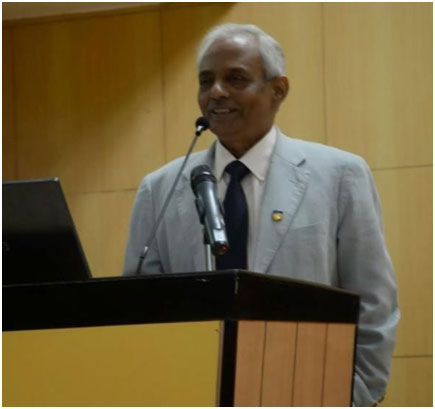
Dr. W. Selvamurthy, President of Amity Science, Technology and Innovation Foundation (ASTIF)